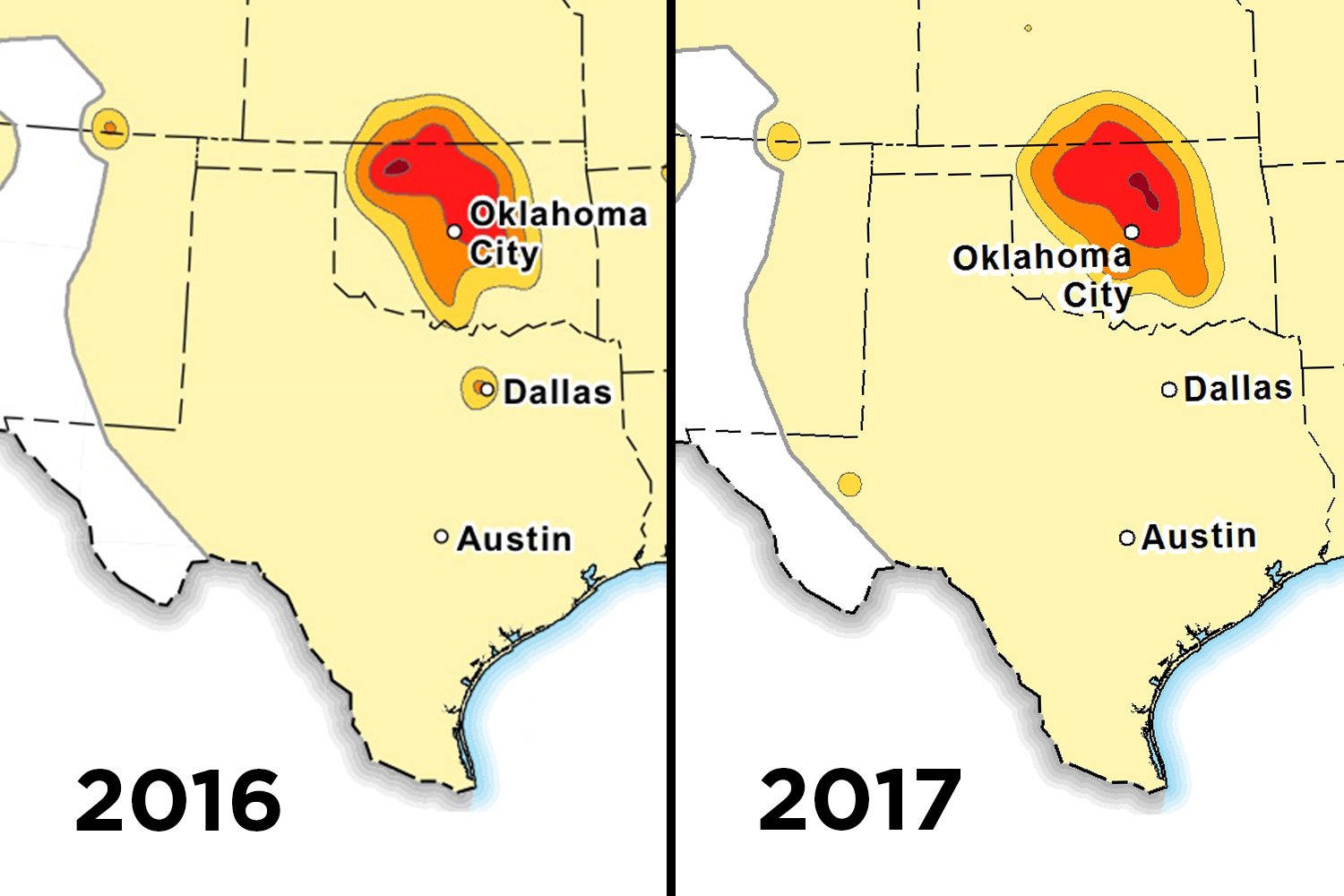Expect fewer man-made earthquakes in Texas, federal agency says
/https://static.texastribune.org/media/images/2014/05/20/TxTrib-DisposalWell008.jpg)
The odds that a man-made earthquake will hit Texas this year have plummeted, according to new risk projections from the U.S. Geological Survey that are based on the amount of seismic activity that's occurred here in the past few years.
In 2015, nine induced quakes rattled the state — specifically the Dallas-Fort Worth area, which is home to the fossil fuel-rich Barnett Shale. Last year, there were zero such tremors. And the drop influenced the USGS risk projections for 2017.
Mark Petersen, chief of the National Seismic Hazard Mapping Project at USGS, said that doesn’t mean parts of Texas won’t experience man-made earthquakes this year but that the chances they will occur have plummeted along with the number of them that happened last year.
That decrease was a big surprise, he added.
For one thing, the number of man-made earthquakes in the United States has increased exponentially in recent years, according to USGS. And the latest projections for Texas are a stark departure from those issued in 2016, which pegged the state as the third-most at-risk state for induced quakes behind only Oklahoma and Kansas — states where the number of quakes, and risk, remains very high in 2017. (Last year was the first time the USGS projected man-made, rather than naturally occurring earthquakes.)

So why the decline in the number of man-made quakes in Texas?
It depends on whom you ask, but Petersen says it’s likely because energy companies are injecting less oilfield wastewater into the ground. That practice has been strongly linked to induced seismic activity — even more so than the controversial well stimulation technique that produces all the wastewater, known as hydraulic fracturing.
And why are energy companies injecting less oilfield wastewater into the ground?
It could be because they are drilling a whole lot less amid a prolonged slump in oil prices and so are producing — and disposing of — less wastewater. Drilling activity raged for nearly a decade until oil prices began slipping in June 2014 and has remained sluggish along with prices.
But the state’s oil and gas regulator — the oddly named Railroad Commission — also approved regulations that year requiring disposal well operators to submit more geographical information. (It also hired a staff seismologist.)
Representatives from industry groups, which supported the rule change, say that has had a significant impact.
"States have also been updating their regulations on wastewater injection in recent years, including here in Texas," Steve Everley, a spokesman for Texans for Natural Gas, said in a statement Wednesday. "More than anything, today’s [USGS] report is a clear sign that the ongoing and collaborative work between scientists, the industry, and state regulators is reducing risks."
Still, the Railroad Commission, which has conducted its own investigations, has not publicly tied any of the shaking to industry activity — even as regulators in other petroleum states acknowledge a connection. It has actively pushed back against conclusions of some outside studies.
Ramona Nye, a spokeswoman for the Railroad Commission, said in an emailed statement that "the commission’s rules were developed based on sound science and best practices regarding seismicity."
Since the 2014 ones were adopted, the commission has received 75 disposal well applications in areas of historic seismicity, she said.
"Of these, 39 permits have been issued with special conditions, such as requirements to reduce maximum daily injection volumes and pressure and/or to record volumes and pressures daily as opposed to monthly," she said, noting 12 applications were returned or withdrawn and nine are still pending.
Read more of the Tribune's related coverage:
- University of Texas at Austin researchers call it “plausible” that underground injections of oil and gas waste triggered a series of temblors that rattled Timpson residents in 2012.
- Federal regulators believe “there is a significant possibility” that a recent surge in North Texas earthquakes is linked to oil and gas activity, even if state regulators won’t say so.
Information about the authors
Learn about The Texas Tribune’s policies, including our partnership with The Trust Project to increase transparency in news.
/https://static.texastribune.org/media/profiles/Kiah.jpg)